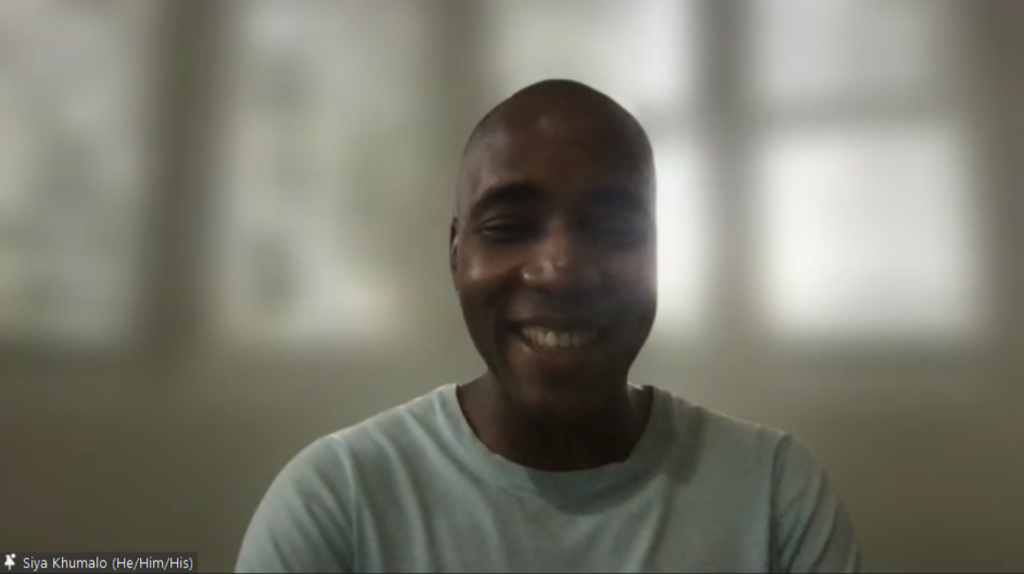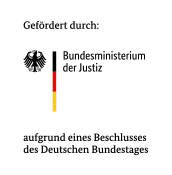The Solution is Discourse: The places we have to go to see our different human experiences
South African author Siya Khumalo was this year’s final guest speaker at the Hirschfeld-Eddy Foundation’s “We believe in change” project.
Connecting via Zoom across sunny Cape Town and gloomy Berlin, the conversation with Siya, moderated by Stefanie Hirsbrunner of Interkontinental, untangled themes of religion, politics, and identity, in Khumalo’s book, “You Have to Be Gay to Know God”.
Khumalo grew up surrounded by religion. This religion permeated all aspects of his life, from dealing with the guilt that came from struggling to reconcile his sexual identity with his faith. This is gleaned from excerpts of his text that he shared with the audience. He read, “Every time I liked a boy the way I like Daniel, my theology told me I’d necessitated the death of this Jesus person who’d become a part of me. That if I could imagine his death repeatedly, he re-experienced the real thing each time I allowed any romantic or sexual breathing room into my life. Oh, and I deserve to burn in hell forever. Because of this dilemma, I wanted to scream at God, ‘You are an evil father!’ But I wouldn’t allow myself to think that…”
Khumalo shared that the church is still very relevant in South Africa today. Talking to us from the Central Business District in Cape Town, where church buildings dot the streets, the church’s hold over society is palpable. Churches in South African rural and urban areas run social, financial and political aspects of life. Churches organize cooperative groups to pool money for school fees, food stock, funerals, and other special occasions. Politicians try to get on church newsletters or guest sermon spots to build their platforms. He shared, “How people think about God and religion becomes a language for how society should be run rightly or not.”
Struggling to reconcile his sexual identity with his faith
When asked by an audience member about homophobia being ignored by African churches, Khumalo responded that double standards exist within the Bible itself. Double standards exist in how we interpret the Bible, for example, women’s rights vs LGBTQI+ rights. “Their theology is based on insecurity fueled by errors and misinterpretations of the Bible”, said Khumalo. He cited incidents of Bible stories used to justify ethnic cleansing and genocide. In South Africa, the Church underwrote a lot of the reasoning behind Apartheid. Immorality clauses and the punishment for interracial marriages were justified with Bible stories. “The Bible was used to justify a theology of racism by painting black people as inherently sinful. Their skin is dark because it’s marred with sin. God has judged it; let us take their land.” Since Apartheid, Khumalo has not seen a united theological effort to phase people into a new way of understanding society. Apart from Archbishop Desmond Tutu, who headed the Truth and Reconciliation Commission and infused Christian values into it, Khumalo believes that the very racist, conservative Christians have retreated from the limelight but continue to perpetuate their racist systems and thoughts. Khumalo sees room for the scriptures in these socio-political debates. “I think we have to work within the same scriptures that were used to justify colonization, racism and all the other horrible things. As a Christian, the basis of human rights is that humans are made in the image of God.”
At a talk he gave to a group of pastors a few years ago on the Bible and sexuality, all the follow-up questions concerned discipline, not sexuality. According to Khumalo, the Church has become a self-sustaining monster with its own rules. “The Bible has become irrelevant. They cherry-pick from it.”
As a Christian, the basis of human rights is that humans are made in the image of God
In 2006, when South Africa legalized same-sex marriages, it became the fifth country in the world and the first African country to do so. With a robust legal system within a complicated socio-political history, balancing legislative progress with social realities is hard. Khumalo believes discourse will help us find better working methods within these systems. Christians must recognize when they’ve justified discrimination and dispossession with their religion but, at the same time, look to the Bible for its discursive qualities. “The solution is discourse”, said Khumalo. He continued, “The Bible itself points to many double standards. Jesus mentioned hypocrite or hypocrisy more than 32 times. It is part of the human condition to want to put other people in the wrong so that you can dispossess them.”
“If you want to change huge parts of society, you have to present the change you want in a language that fits their theology and into the understanding that the church has of itself”, said Khumalo.
Xou have to present the change you want in a language that fits
You Have to be Gay to Know God is a memoir that invites people within the church to think of conversations around human sexuality and human rights differently. The title was inspired by Khumalo’s visit to the library at St. Vincent’s School for the Deaf, where he saw a sign asking students to talk as much as possible. The sign encouraged speech because it recognized that while school might be a safe environment for deaf kids, the outside world was less so. “And I thought to myself; it’s such a surprise in a library to see a sign that says to speak as much as you can. In most libraries, the sign says to be quiet. And so I started wondering, where do you have to go to see how different our human experiences can be? You may have to go to a school for the deaf to know that it’s a hearing world, and then, I started thinking about these paradoxes.”
Next up for Khumalo is completing his science fiction novel featuring angels. In his new book, the humans of the future (who we think of as angels today) time travel with a digital simulation of their bodies and leave the humans of the present puzzled by their technological feats.
A Hirschfeld-Eddy-Foundation event in cooperation with InterKontinental, as part of the project, “We believe in change: Human rights, freedom of religion or belief, and preventing anti-LGBTIQ+ violence and discrimination.”
“You Have to Be Gay to Know God” is available at Interkontinental. Interkontinental e.V. also organizes the annual African Book Festival Berlin.
Written by Ifeatu Nnaobi
An article for the Hirschfeld Eddy Foundation project “We believe in change”: Human rights, freedom of religion or belief, and non-discrimination. All publications for the project can be found under the tag WBIC-2023 (some content in English)





